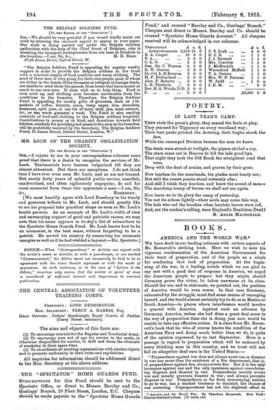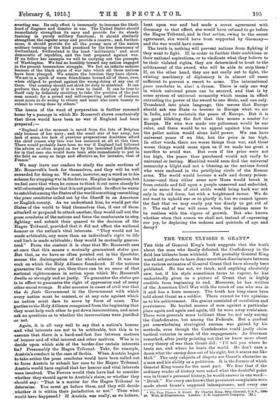BOOKS.
AMERICA AND THE WORLD WAR.*
We have dealt in our leading columns with certain aspects of Mr. Roosevelt's striking book. Here we wish to note his vigorous condemnation of the American Government for their want of preparation, and of the people as a whole for condoning that lack of preparation. At the begin- ning of the war, in a leading article which we are glad to say met with a good deal of response in America, we urged the American people to prepare lest they might, should Germany prove the victor, be taken unawares at its close. Should the war end in stalemate, we pointed out, the position of America would be even worse. In that case Germany, exhausted by the struggle, must find some means of recouping herself, and she would almost certainly try to do so in Mexico or South America—in places where interference would involve a quarrel with America. Against such an advance by Germany, America, unless she had done a great deal more in the way of preparation than she is doing just now, would be unable to take any effective action. It is clear from Mr. Rouse. velt's book that he, who of course knows the condition of the American Navy and Army much better than we do, is quite of the opinion expressed by us last September. Here is a passage in regard to preparation which will be endorsed by every thinking man in this country, and we trust will not fall on altogether deaf ears in the United States :— " Preparedness against war does not always avert war or disaster in war any more than the existence of a fire department, that is, of preparedness against fire, always averts fire. But it is the only insurance against war and the only insurance against overwhelm. ing disgrace and disaster in war. Preparedness usually averts war and usually prevents disaster in war ; and always prevents disgrace in war. Preparedness, so far from encouraging nations to go to war, has a marked tendency to diminish the chance of war occurring. Unpreparedness has not the slightest effect in • America and the World War. By Theodore Roosevelt, New Yorks Charlee &Raba.% Sane. [75 cents. net. averting war. Its only effect is immensely to increase the likeli- hood of disgrace and disaster in war. The United States should immediately strengthen its navy and provide for its steady training in purely military functions; it should similarly strengthen the regular army and provide a reserve ; and. further- snore, it should provide for all the young men of the nation military training of the kind practised by the free democracy of Switzerland. Switzerland is the bast 'militaristic' and most democratic of republics, and the best prepared against war. It we follow her example we will be carrying out the precepts of Washington. We feel no hostility toward any nation engaged in the present tremendous struggle. We feel an infinite easiness because of the black abyss of war into which all these nations have been plunged. We admire the heroism they have ehown. We act in a spirit of warm friendliness toward all of them, even when obliged to protest against the wrong-doing of any one of them. Oar country should not shirk its duty to mankind. It can perform this duty only if it is true to itself. It can be true to Itself only by definitely resolving to take the position of the just -man armed: for a proud and self-respecting nation of freemen must scorn to do wrong to others and must also scorn tamely to submit to wrong done by others."
The lesson of the want of preparation is further rammed home by a passage in which Mr. Roosevelt shows conclusively that there would have been no war if England had been prepared "England at the moment is saved from the fate of Belgium only because of her navy ; and the small sire of her army, her lack of arms, her lack of previous preparations doubtless afford the chief reason why this war has occurred at all at this time. There would probably have been no war if England had followed the advice so often urged on her by the lamented Lord Roberts, for in that case she would have been able immediately to put in -the field an army as large and effective as, for instance, that of Franco."
We may leave our readers to study the main sections of Mr. Roosevelt's book for themselves, and they will be well rewarded for doing so. We must, however, say a word as to his scheme for stopping war in the future. Iiisplan is ingeniows, but we feel sure that when be comes to think it out more closely he will reluctantly realize that it is not practical. In effect be wants to establish among the States of the world something resembling the posse eouritatus called out by the Sheriff in an American or English county. As we understand him, he would get the States of the world to bind themselves that, if one of them attacked or prepared to attack another, they would call out the posse coinitatue of the nations and force the combatants to stop fighting and submit their quarrel to the decision of the Hague Tribunal, provided that it did not affect the national honour or the nation's vital interests. "They would not be made arbitrable, any more than an individual's right to life and limb is made arbitrable; they would be mutually guaran- teed." From the context it is clear that Mr. Roosevelt sees at once that this means a mutually guaranteed status quo. But that, as we have so often pointed out in the Spectator, ;means the disintegration of the whole scheme. It was the rock on which the Holy Alliance foundered. If the nations guarantee the status quo, then there can be no more of that national righteousness in action upon which Mr. Roosevelt dwells so strongly and so justly. To guarantee the status quo is in effect to guarantee the right of oppression and of many other moral wrongs. It also assumes in cases of civil war that the de facto Government is the Government with which every nation must be content, or at any rate against which no nation must dare to move by force of arms. The parties to the Holy Alliance recognized from the beginning that they most help each other to put down insurrections, and must ask no questions as to whether the insurrections were justified or not.
Again, it is all very well to say that a nation's honour and vital interests are not to be arbitrable, but this is to assume that there is a bard-and-fast line between matters of honour and of vital interest and other matters. Who is to decide upon which side of the border-line certain interests lie? Presumably the Hague TribunaL Take, for example, Austria's conduct in the case of Serbia. When Austria began to take action the posse comitalus would have been called out to force Austria to submit her case to the Hague Tribunal. Austria would have replied that her honour and vital interests were involved. The Powers would then have had to consider -whether they should agree to Austria's claim, or whether they :should tray: "That is a matter for the Hague Tribunal to determine. You mast go before them, and they will decide whether it is within their jurisdiction or not." Then what would have happened ? H Austria was really. as we believe,
bent upon war and had made a secret agreement with Germany to that effect, she would have refused to go before the Hague Tribunal, and in that action, owing to the secret agreement, she would have been supported by Germany— and the war would have come.
The truth is, nothing will prevent nations from fighting if they want to fight. If, in order to further their ambitious or their national aspirations, or to vindicate what they believe to be their violated rights, they are determined to trust to the arbitrament of the sword, who will be able to stop them P If, on the other hand, they are not really out to fight, the existing machinery of diplomacy is in almost all cases sufficient to prevent a resort to arms. The international posse comilatus is, alas! a dream. There is only one way in which universal peace can be secured, and that is by some system of universal monarchy which means in effect entrusting the power of the sword to one State, and one only. Translated into plain language, this means that Europe should ask one State to become in Europe what we are in India, and to maintain the peace of Europe. But it is no good blinking the fact that this means a master for Europe. He who was made our policeman would be our ruler, and there would be no appeal against him because the police nation would alone hold power. We can have universal peace if we like, but the price is too high. In other words, there are worse things than war, and those worse things would oome upon us if we made too great a sacrifice to avoid war. But even if the price were not too high, the peace thus purchased would not really be universal or lasting. Mankind would soon find the universal monarchy a blight and not a blessing, as the nations found who were enclosed in the petrifying circle of the Roman arms. The world would become a safe and dreary prison- house—and then either some new Huns would break in from outside and fall upon a people unnerved and enfeebled, or else some form of civil strife would bring back war not only in its old form, but with a heightened terror. We do not want to uphold war or to glorify it, but we cannot ignore the fact that we may easily pay too dearly to get rid of it. The end of war will come when the nations cease to be restless with the vigour of growth. But who knows whether when that comes we shall not, instead of expressing our joy, be deploring the sadness and quietude of age and decay P







































 Previous page
Previous page